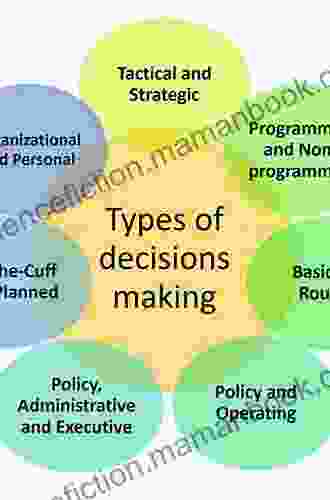10 Leadership Strategies for Effective Decision Making

4.8 out of 5
| Language | : | English |
| File size | : | 4247 KB |
| Text-to-Speech | : | Enabled |
| Screen Reader | : | Supported |
| Enhanced typesetting | : | Enabled |
| Word Wise | : | Enabled |
| Print length | : | 167 pages |
Effective decision making is a crucial skill for leaders. The decisions you make can have a significant impact on your team, your organization, and your career. That's why it's important to develop a strong understanding of the decision making process and to have a set of strategies in place to help you make better decisions.
In this article, we'll discuss 10 leadership strategies for effective decision making. These strategies will help you to gather information, analyze options, and make decisions that are aligned with your values and goals.
1. Gather Information
The first step in effective decision making is to gather information. This means collecting data from a variety of sources, including your team, your customers, and your competitors. The more information you have, the better equipped you'll be to make an informed decision.
When gathering information, it's important to be objective and to avoid bias. Consider all of the available information, even if it doesn't support your preferred outcome. The goal is to make a decision that is based on the facts, not on your emotions.
2. Analyze Options
Once you have gathered information, it's time to analyze your options. This involves weighing the pros and cons of each option and identifying the potential risks and rewards. It's also important to consider the impact that each decision will have on your team, your organization, and your career.
When analyzing options, it's helpful to use a decision matrix. A decision matrix is a tool that helps you to visualize the different options and their potential outcomes. This can make it easier to see the advantages and disadvantages of each option and to make a decision that is in your best interests.
3. Consider Your Values
Your values should play a role in every decision you make. Your values are the principles that guide your behavior and help you to make choices that are consistent with your beliefs. When you're making a decision, take some time to reflect on your values and to make sure that your decision is aligned with them.
For example, if you value integrity, you're less likely to make a decision that you know is unethical. If you value innovation, you're more likely to make decisions that will help your team to be creative and to take risks.
4. Seek Input from Others
It's important to seek input from others when you're making a decision. This can help you to get a different perspective on the situation and to make a more informed decision. When seeking input from others, be sure to include people who have different backgrounds, experiences, and perspectives.
You can seek input from others in a variety of ways. You can hold a brainstorming session, conduct a survey, or simply ask for feedback from your team members. The important thing is to get a variety of perspectives so that you can make a decision that is well-rounded.
5. Sleep on It
If you're struggling to make a decision, it can be helpful to sleep on it. When you sleep, your brain has time to process information and to come up with new ideas. When you wake up, you may have a fresh perspective on the situation and be better able to make a decision.
If you're short on time, you can try to take a short nap or to meditate. This can still give your brain time to process information and to come up with new ideas.
6. Be Decisive
Once you've gathered information, analyzed your options, and considered your values, it's time to make a decision. It's important to be decisive and to avoid procrastinating. The longer you wait to make a decision, the more likely you are to overthink it and to make a poor decision.
When making a decision, be confident in your decision and be prepared to defend it. If you're not sure about your decision, seek input from others or take some time to sleep on it. But once you've made a decision, stick with it and don't second-guess yourself.
7. Take Action
Once you've made a decision, it's important to take action. This means implementing your decision and making sure that it is carried out effectively. When taking action, be clear about your expectations and be prepared to provide support to your team.
It's also important to monitor the results of your decision and to make adjustments as needed. If your decision is not working as you expected, don't be afraid to change course.
8. Learn from Your Mistakes
Everyone makes mistakes. The important thing is to learn from your mistakes and to avoid making the same ones twice. When you make a mistake, take some time to reflect on what went wrong and what you could have done differently. This will help you to make better decisions in the future.
It's also important to be open to feedback from others. If someone points out a mistake that you've made, be willing to listen to them and to learn from their feedback. This can help you to avoid making the same mistake again.
9. Be Flexible
The world is constantly changing. That's why it's important to be flexible and to be able to adapt to change. This means being open to new ideas and being willing to change your plans when necessary.
When you're making a decision, be aware of the potential risks and rewards. Be prepared to change your course if necessary. This will help you to make decisions that are resilient and that can withstand change.
10. Be Courageous
Making decisions can be difficult. Sometimes, you may have to make a decision that is unpopular or that is outside of your comfort zone. When this happens, be courageous and stand by your decision. Believe that you are making the right decision and be prepared to defend it.
Courage is not the absence of fear. It is the ability to act in spite of fear. When you are courageous, you are willing to take risks and to make decisions that are in the best interests of your team, your organization, and your career.
Effective decision making is a crucial skill for leaders. The strategies discussed in this article will help you to make better decisions and to lead your team to success. Remember to gather information, analyze options, and consider your values when making decisions. Seek input from others, be decisive, and take action. Learn from your mistakes, be flexible, and be courageous. By following these strategies, you can develop your decision making skills and become a more effective leader.
4.8 out of 5
| Language | : | English |
| File size | : | 4247 KB |
| Text-to-Speech | : | Enabled |
| Screen Reader | : | Supported |
| Enhanced typesetting | : | Enabled |
| Word Wise | : | Enabled |
| Print length | : | 167 pages |
Do you want to contribute by writing guest posts on this blog?
Please contact us and send us a resume of previous articles that you have written.
 Top Book
Top Book Novel
Novel Fiction
Fiction Nonfiction
Nonfiction Literature
Literature Paperback
Paperback Hardcover
Hardcover E-book
E-book Audiobook
Audiobook Bestseller
Bestseller Classic
Classic Mystery
Mystery Thriller
Thriller Romance
Romance Fantasy
Fantasy Science Fiction
Science Fiction Biography
Biography Memoir
Memoir Autobiography
Autobiography Poetry
Poetry Drama
Drama Historical Fiction
Historical Fiction Self-help
Self-help Young Adult
Young Adult Childrens Books
Childrens Books Graphic Novel
Graphic Novel Anthology
Anthology Series
Series Encyclopedia
Encyclopedia Reference
Reference Guidebook
Guidebook Textbook
Textbook Workbook
Workbook Journal
Journal Diary
Diary Manuscript
Manuscript Folio
Folio Pulp Fiction
Pulp Fiction Short Stories
Short Stories Fairy Tales
Fairy Tales Fables
Fables Mythology
Mythology Philosophy
Philosophy Religion
Religion Spirituality
Spirituality Essays
Essays Critique
Critique Commentary
Commentary Glossary
Glossary Bibliography
Bibliography Index
Index Table of Contents
Table of Contents Preface
Preface Introduction
Introduction Foreword
Foreword Afterword
Afterword Appendices
Appendices Annotations
Annotations Footnotes
Footnotes Epilogue
Epilogue Prologue
Prologue Eirik Westcoat
Eirik Westcoat Jane Tyson Clement
Jane Tyson Clement Michael Ruhlman
Michael Ruhlman Tochi Onyebuchi
Tochi Onyebuchi Angela Kubiak
Angela Kubiak Raven S Mind Publishing
Raven S Mind Publishing Mcclintock Acsmhour
Mcclintock Acsmhour Sandy Appleyard
Sandy Appleyard J A Jance
J A Jance Will Brehm
Will Brehm Stuart E Lucas
Stuart E Lucas Jeff Lowenfels
Jeff Lowenfels Dr Shefali Tsabary
Dr Shefali Tsabary Nikos Kazantzakis
Nikos Kazantzakis Latica Mcghee
Latica Mcghee David Podlipny
David Podlipny Ilan Bendelman
Ilan Bendelman Sarah Steele
Sarah Steele Graham Tippett
Graham Tippett Siegfried Futterlieb
Siegfried Futterlieb
Light bulbAdvertise smarter! Our strategic ad space ensures maximum exposure. Reserve your spot today!

 Grayson BellThe Ultimate Study Guide for Zora Neale Hurston's "Conscience of the Court"...
Grayson BellThe Ultimate Study Guide for Zora Neale Hurston's "Conscience of the Court"...
 Stanley BellWant to Mine Ethereum or Mine Bitcoin on Your Phone? Well, You Can't... But...
Stanley BellWant to Mine Ethereum or Mine Bitcoin on Your Phone? Well, You Can't... But... Holden BellFollow ·8.6k
Holden BellFollow ·8.6k Darren BlairFollow ·17k
Darren BlairFollow ·17k Chandler WardFollow ·10.8k
Chandler WardFollow ·10.8k Zadie SmithFollow ·14.2k
Zadie SmithFollow ·14.2k Jack PowellFollow ·11.7k
Jack PowellFollow ·11.7k Steven HayesFollow ·16.8k
Steven HayesFollow ·16.8k Marc FosterFollow ·19.8k
Marc FosterFollow ·19.8k Jerome PowellFollow ·15.8k
Jerome PowellFollow ·15.8k

 Ashton Reed
Ashton ReedClean(ish) Food for People Who Like to Eat Dirty
By: [Your Name] Are...

 Ronald Simmons
Ronald SimmonsThe Handbook for Educators: A Comprehensive Guide to...
The Handbook for...

 Derrick Hughes
Derrick HughesAny Place Hang My Hat: A Hauntingly Beautiful Novel by...
A Masterpiece of...

 Adrien Blair
Adrien BlairFly Me to the Moon Vol. 5: A Lunar Odyssey through...
In the vast...

 William Powell
William PowellTips By Gardeners On Variety Of Subjects
Gardening...
4.8 out of 5
| Language | : | English |
| File size | : | 4247 KB |
| Text-to-Speech | : | Enabled |
| Screen Reader | : | Supported |
| Enhanced typesetting | : | Enabled |
| Word Wise | : | Enabled |
| Print length | : | 167 pages |










